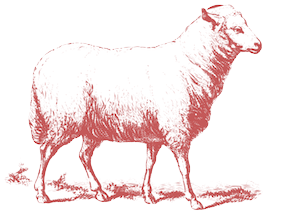You hear it over and over that pigs are the most intelligent farm animals. People often say pigs are smarter than dogs. Intelligence comes in a lot of varieties, however, and the pig's greatest talent is for stubbornness. Now, I'm not just slandering the species because of my constant frustration with escaping swine, though they have a Houdini-like proclivity for moving through electric fences. The stubbornness of a pig extends even beyond its own best interests. You can open a gate, sixteen feet wide, and the pig will still try to root up and ram through the fence two feet to the right of the gate. It prefers to move in a straight line, obstacles be damned. But unfortunately, even as a member of the species that claims to be wisest of the wise, I can't claim that we are above such singlemindedness. Names and faces have been changed to protect the innocent: Recently Rebecca and I had the opportunity to observe the annual winter meeting of the West Timbuktu (ahem) Farmers Market (WTFM). Several things are wrong to begin with: the member farmers of the market, who govern it, only meet twice a year; the market schedules its meetings on the same day the weekly market occurs, that is to say after a long, hard day of work; and the market has no formal decision-making process other than a show of hands. The result is an agenda with a dozen major points of discussion on it, none of which can possibly be resolved in a single meeting. The attempt to do so without any organizing principle for the meeting leads to three hours and change of meandering discussion, arguing, bickering, and outright misconstrual.
Members of the market divide themselves into old-school and new-school. The old-school marketers tend to be truck farmers who grow a great variety of vegetables in their back yard and go to the market for enjoyment and supplementary income. The new-school are folks, such as the farmers I work for, who derive their entire livelihood from the land. These folks are interested in running the market profitably but fairly. The WTFM has been around for 25 years and was founded by the old-school. They think of the market as a convenient place to make a few bucks on a Saturday. The new-school sees the market as a community forum, a cooperative business venture, and, to some, a platform for social change. The new-school would like to see the market expand gradually but substantially. The old-school is a priori opposed to change.
The new farmers know that, to expand, the market needs a dedicated manager to enforce rules, work with the press to promote the WTFM, and take care of general secretarial duties. In the present arrangement these tasks are handled by member farmers who, during market season, hardly have enough time to tie their shoes. The new-school wants to hire a part-time, passionate young person to book advertisements ("Vine-ripe tomatoes available next week!"), hire performing artists ("Steel String Theory appearing next week at the West Timbuktu Farmers Market!"), and manage the market's general business ("Wow, we really have $1000 left over in the budget!?"). The old-school won't see the logic in this and argues that the only people who would apply would be, like themselves, looking to pick up a few extra bucks on the weekend. Obviously they've never heard of Slow Food, WWOOF (Willing Workers on Organic Farms), the organic or local food movements, or militant veganism. I can think of at least six people, just among my own friends, who might cut off a toe to get a job like this one; forget being paid for it; forget that Asheville is full of underpaid, over-motivated neo-Aquarians
The controversy between new- and old-school is mainly over money. The current fee structure requires member farmers to pay $25 per year in dues. Do the math: that's 7¢ per day, two bucks a month. Day members, who have access to five slots on a first-come, first-served basis, pay $5 per day and stop paying after 6 visits, which means they effectively pay the same as permanent member farmers without getting a reserved space. This allows the market to pay for insurance, about three newspaper ads per season, and six mentions on the local NPR station. The new-school would like to raise the permanent member dues to $50 per year and day member fees to $25 per day with no maximum. Day members make an average of $400 per market day; some make over $1000. That alone justifies the increase in day member fees; they simply haven't kept pace with inflation, and I don't think that they have changed since they were set in the mid-80's. The old-school argues that "no one would come" if the market raised day fees. As for permanent member fees, $50 per year amounts to about $4.00 per month, less than a gallon and a half of gas. The old school argues that the increase is too steep and many people stated that it would be a financial burden on them that might prevent them from taking part in the market. I don't know the economics of their lives, but I do see how much produce they sell on a Saturday.
So, the meeting went on for three hours and nothing was decided. We pigs butted heads and compared snout lengths, but got no closer to the other side of the fence. I may be frustrated with the perspective of the old-school, but the new-school shares no less blame for the lack of progress. These folks badly need to learn the meaning of consensus. The embittered stubbornness over $25 per year is the reason so many old farmers were driven out of business: a complete unwillingness to adapt old ways in order to preserve them.
